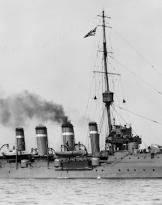"It is not wealth or ancestry but honorable conduct and a noble disposition that maketh men great" (I am not wealth or lineage, but honorable conduct and noble character to make a man great), recited the praise that accompanied the Victory Cross: the highest military honor envisaged for His Majesty's soldiers.
He was awarded it Jutland Jack after that on May 31, 1916, off the Danish coast, he met for the first time after a year in the Navy of his Majesty the fearsome enemy and an early death that made him a legend and an example for all the boys of England.
Behind the shield of protection of one of the ten 140 mm naval pieces (5.5 inches) that pulled bordered by the HMS light cruiser Chester during the early stages of the Jutland battle, the sixteen-year-old Jack Cornwell - the last living servant of his piece - directed fire on enemy vessels that, on that day, in the name of Kaiser Wilhelm, wanted to destroy the Grand fleet of the Royal Navy.
Boy Cornwell he did not intend to give way to the enemy who unloaded heavy trips on his cruiser; everywhere the splinters killed young sailors, severed the legs and arms of the servants to pieces. First to be targeted along with the hull.
Ben 17 salve shot from the SMS guns Frankfurt they had hit the Chester. A direct hit had hit the very forecastle where Cornwell's cannon was, killing everyone but him. Badly wounded by a splinter in the chest and a head from which the blood was pouring copiously, the young Jack remained undeterred in his place among the smoke and spray of the North Sea.

Taking possession of the cap of the officer who had fallen to the orders given, he replied as in the best British seafaring tradition: "Aye Sir!".
He fell lifeless among the bodies of his companions.
Born in January of the 1900 a Leyton, the young John Travers Cornwell, dropped out of school at the age of 13 to work as a delivery boy for Brooke Bond & Co.
At the outbreak of the First World War he tried to enlist in the Navy several times but, being a minor and not having obtained parental permission, he was refused. On yet another attempt, presented the credentials of his employers and the principal of the institution where he had studied, he joined the Royal Navy as Boy Seaman of 1ª class: one of the degrees reserved for underage sailors.
A young man of good behavior, trained in the use of artillery, he distinguished himself for the enormous courage shown during the action. As soon as the battle with the German cruisers ended, it was found next to the piece of artillery. He died of his injuries by bringing back the 2 June: just at the end of the 72 hours that lasted the battle of Jütland.
Coming from a poor family, he was buried in a mass grave near his birthplace by his mother who, warned of her son's serious condition, was unable to reach him for a final farewell.
Following the mention made by the commander of Chester, Captain RN Lawson, was awarded the Victoria Cross, exhumed and, after receiving a solemn military funeral, buried at Manor Park cemetery of London where an effigy bears the epitaph mentioned at the beginning.
"The injuries that caused his son's death were reported in the first minutes of the action, but he remained stable in his place, next to his cannon, awaiting orders. (...) He remained there, standing under heavy fire, with his only courageous heart and God's help to support him. (...) I am unable to express with these words the admiration I feel for the child you have lost in this world."- Captain Lawson wrote in a letter to the mother of the young Cornwell.
The event was echoed throughout the country, making the headlines of all the newspapers in the kingdom and making it Jutland Jack an English legend.
One hundred years ago it was consumed the greatest naval battle of the First World War and the Royal Navy, by merit and tradition, confirmed itself as the most powerful fleet in the world, passing between the value of the Drakes and the Nelsons and that of young heroes like Jack boy.
Today the 140mm piece from HMS Chester is exhibited at the Imperial War Museum in London.
"1st Class John Travers Cornwell who was mortally wounded early in the action, but nevertheless remained standing alone at most exposed post, quietly awaiting orders till the end of the action, with the gun's crew dead and wounded around him. He was under 16½ years old. I regret that he has since died, but I recommend his case for special recognition in justice to his memory.."
Admiral of the Fleet David Richard Beatty













